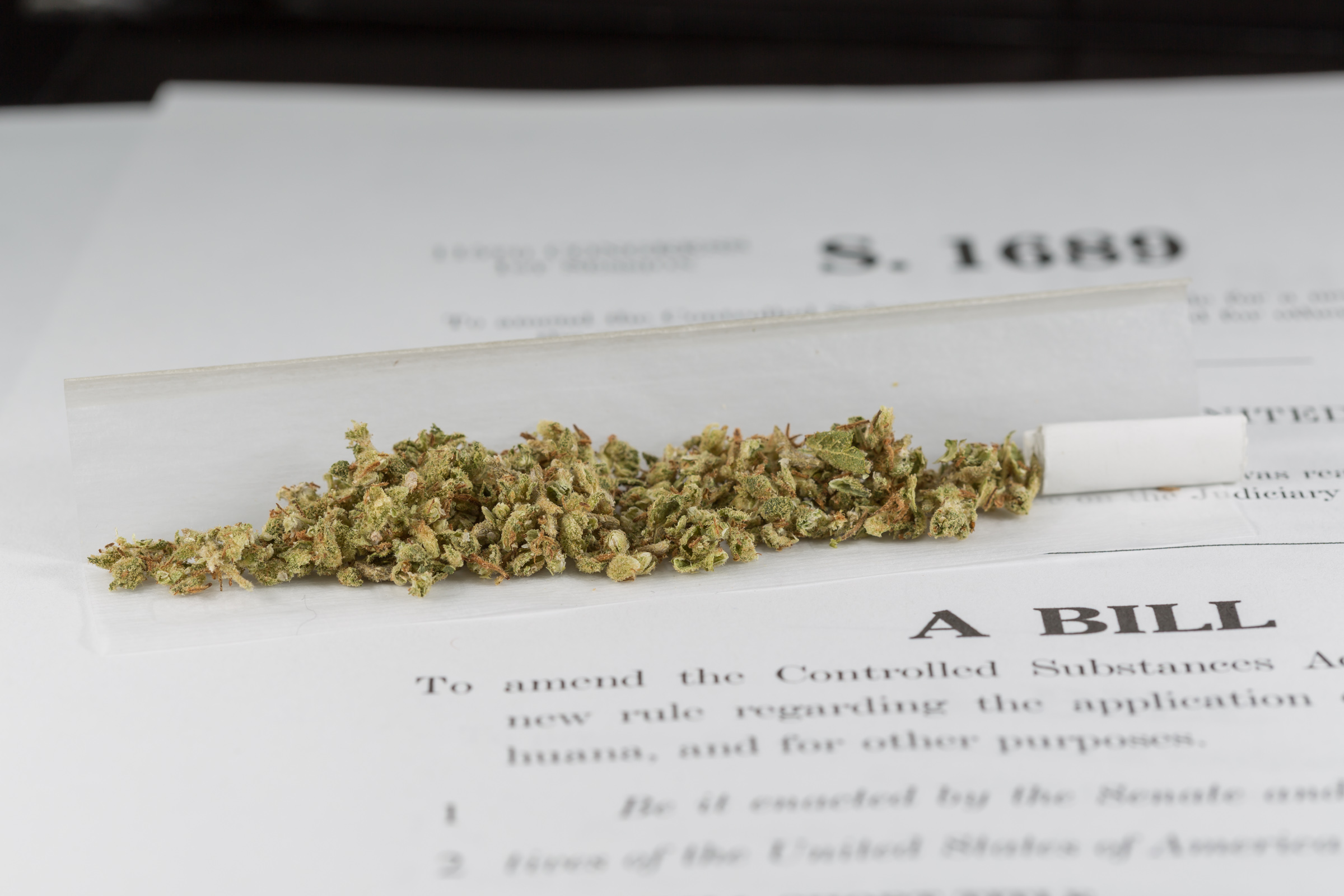Politics
Presidential Candidates Introduce New Version Of Marijuana Justice Act

Sen. Cory Booker (D-NJ) and several of his rivals for the 2020 Democratic presidential nomination are joining forces on Thursday to re-file a new version of the most far-reaching marijuana legislation ever introduced in Congress.
TODAY: I'm reintroducing the Marijuana Justice Act – my bill to legalize marijuana on the federal level, expunge records, and reinvest in the communities that have been hurt from the war on drugs. pic.twitter.com/LWL0j7fN5F
— Sen. Cory Booker (@SenBooker) February 28, 2019
The bill, the Marijuana Justice Act, would remove cannabis from the Controlled Substances Act and withhold certain federal funding from states that disproportionately enforce marijuana criminalization laws against people of color and low-income individuals.
Watch Booker and colleagues discuss the legislation below:
The legislation would also automatically expunge past federal convictions for cannabis use and possession, as well as create a fund to reinvest in communities hardest hit by the war on drugs.
“The War on Drugs has not been a war on drugs, it’s been a war on people, and disproportionately people of color and low-income individuals,” Booker said in a press release. “The Marijuana Justice Act seeks to reverse decades of this unfair, unjust, and failed policy by removing marijuana from the list of controlled substances and making it legal at the federal level.”
“But it’s not enough to simply decriminalize marijuana. We must also repair the damage caused by reinvesting in those communities that have been most harmed by the War on Drugs,” he said. “And we must expunge the records of those who have served their time. The end we seek is not just legalization, it’s justice.”
The legislation is initially cosponsored by Sens. Ron Wyden (D-OR), Kirsten Gillibrand (D-NY), Bernie Sanders (I-VT), Kamala Harris (D-CA), Jeff Merkley (D-OR), Elizabeth Warren (D-MA) and Michael Bennet (D-CO).
“As I said during my 2016 campaign, hundreds of thousands of people are arrested for possession of marijuana every single year,” Sanders said. “Many of those people, disproportionately people of color, have seen their lives negatively impacted because they have criminal records as a result of marijuana use. That has got to change. We must end the absurd situation of marijuana being listed as a Schedule 1 drug alongside heroin. It is time to decriminalize marijuana, expunge past marijuana convictions and end the failed war on drugs.”
600,000 people, disproportionately people of color, were arrested for possession of marijuana in 2017.
It is time to decriminalize marijuana, expunge past marijuana convictions and end the failed war on drugs.
— Bernie Sanders (@SenSanders) February 28, 2019
“Millions of Americans’ lives have been devastated because of our broken marijuana policies, especially in communities of color and low-income communities,” said Gillibrand. “Currently, just one minor possession conviction can take away a lifetime of opportunities for jobs, education, and housing, tear families apart, and make people more vulnerable to serving time in jail down the road. It is shameful that my son would likely be treated very differently from one of his Black or Latino peers if he was caught with marijuana, and legalizing marijuana is an issue of morality and social justice. I’m proud to work with Senator Booker on this legislation to help fix decades of injustice caused by our nation’s failed drug policies.”
The disparity in who gets arrested for marijuana possession is one sign of how unjustly our drug laws are enforced. It's time to legalize marijuana nationwide and start repairing the harm done to communities of color by the War on Drugs. We need the Marijuana Justice Act. pic.twitter.com/fbaen37m8r
— Kirsten Gillibrand (@SenGillibrand) February 28, 2019
Legalizing marijuana is about morality and social justice. A minor possession conviction can take away a lifetime of opportunities for jobs, education, & housing—esp. in communities of color & low income communities. Time to fix our broken policies. Proud to co-sponsor this bill. https://t.co/1IcjBlDkOi
— Sen. Kirsten Gillibrand (@gillibrandny) February 28, 2019
“Marijuana should be legalized, and we should wipe clean the records of those unjustly jailed for minor marijuana crimes. By outlawing marijuana, the federal government puts communities of color, small businesses, public health and safety at risk,” said Warren.
It’s time to legalize marijuana, and stand against an unjust criminal justice system. I’m proud to co-sponsor the Marijuana Justice Act. https://t.co/wIAhoNreSc
— Elizabeth Warren (@SenWarren) February 28, 2019
“Marijuana laws in this country have not been applied equally, and as a result we have criminalized marijuana use in a way that has led to the disproportionate incarceration of young men of color. It’s time to change that,” said Harris. “Legalizing marijuana is the smart thing to do and the right thing to do in order to advance justice and equality for every American.”
Too many lives have been ruined because of the War on Drugs. That’s why I am proud to co-sponsor @corybooker’s legislation to legalize marijuana and expunge the records of those convicted of offenses related to marijuana use and possession.
— Kamala Harris (@KamalaHarris) February 28, 2019
Wyden said that “the War on Drugs has destroyed lives, and no one continues to be hurt more than people of color and low-income communities. There is a desperate need not only to correct course by ending the failed federal prohibition of marijuana, but to right these wrongs and ensure equal justice for those who have been disproportionately impacted.”
No one continues to be hurt more by the War on Drugs than people of color and low-income communities. It's time to end the failed federal prohibition of marijuana and right these wrongs by ensuring equal justice for those hit hardest.
Proud to join @SenBooker in this fight! https://t.co/af8mI0swEp
— Ron Wyden (@RonWyden) February 28, 2019
Bennet added: “This long-overdue change will help bring our marijuana laws into the 21st century. It’s past time we bring fairness and relief to communities that our criminal justice system has too often left behind.”
Today I'm joining @CoryBooker in the fight to pass the #MarijuanaJusticeAct, making it legal at the federal level. The time to decriminalize #cannabis is now!
— Jeff Merkley (@JeffMerkley) February 28, 2019
Reps. Barbra Lee (D-CA) and Ro Khanna (D-CA) filed a House companion bill.
“Communities of color and low-income communities have been devastated by the War on Drugs,” Lee said. “As Co-Chair of the Congressional Cannabis Caucus, I’m proud to sponsor legislation that would legalize marijuana at the federal level, address the disproportionate impact of prohibition on people of color by expunging criminal convictions, and promote equitable participation in the legal marijuana industry by investing in the communities hardest hit by the failed War on Drugs.”
Today, I’m reintroducing the #MarijuanaJusticeAct with my colleagues @SenBooker and @RepRoKhanna, which will:
🇺🇸 End the federal marijuana prohibition
⚖️ Expunge non-violent federal marijuana convictions
💰 Invest in communities devastated by the failed #WarOnDrugs— Rep. Barbara Lee (@RepBarbaraLee) February 28, 2019
The failed #WarOnDrugs has devastated families around the country. As more states legalize cannabis, our reforms must include restorative justice for communities of color that have been most impacted these discriminatory policies. #MarijuanaJusticeAct https://t.co/1hi1ly1M2O
— Rep. Barbara Lee (@RepBarbaraLee) February 28, 2019
“Communities of color have been disproportionately impacted by misguided marijuana policy for far too long,” Khanna said. “Rep. Lee, Sen. Booker, and I are proud to introduce this important legislation and deliver justice for so many Americans.”
Communities of color have been disproportionately impacted by misguided marijuana policy for far too long. @RepBarbaraLee, @SenBooker and I are proud to introduce this important legislation and deliver justice for so many Americans #MarijuanaJusticeAct. pic.twitter.com/o7h8TcUP93
— Rep. Ro Khanna (@RepRoKhanna) February 28, 2019
The funds withheld from states deemed to have discriminatory arrest and incarceration rates for cannabis would go toward a new community reinvestment fund, which would “establish a grant program to reinvest in communities most affected by the war on drugs, which shall include providing grants to impacted communities for programs” that include libraries, community centers and job training.
The reality is, many folks from more privileged backgrounds can use marijuana without their whole future will be ruined. The #MarijuanaJusticeAct is about racial inequality. Proud to stand with my friends (with a guest appearance by Frederick Douglass) today in this effort. pic.twitter.com/doNZsBd0W3
— Rep. Ro Khanna (@RepRoKhanna) March 1, 2019
People who have been “aggrieved by a disproportionate arrest rate or a disproportionate incarceration rate” would be able to file civil lawsuits against states under the bill.
Let’s legalize marijuana at the federal level, push states to do the same, AND help those who have suffered due to its prohibition.
— Cory Booker (@CoryBooker) February 28, 2019
During the last Congress, the Booker’s Marijuana Justice Act garnered six cosponsors in the Senate, while 43 House members signed on to that chamber’s version of the bill. Neither received hearings or votes.
Legalization advocates cheered the bill’s reintroduction.
“Cory Booker and Barbara Lee have single-handedly shifted the conversation in Congress on cannabis reform. The failures and harms caused by decades of cannabis prohibition, particularly the impact on low-income communities and communities of color, are undisputed,” said Queen Adesuyi, policy coordinator for the Drug Policy Alliance. “For decades, marijuana arrests, convictions, and subsequent collateral consequences have disrupted lives, which have also destroyed the social and economic fabric of certain communities. Now with Democrats in control of the House, it’s time to right these wrongs and advance this conversation even further by passing cannabis reform that is centered on criminal justice reform and economic empowerment of impacted communities.”
The new legislation’s language is identical to that filed last Congress, with the exception that the community reinvestment fund covers fiscal years 2020 through 2042 instead of 2018 through 2040 as in the last version.
“The Marijuana Justice Act is the most comprehensive piece of federal legislation ever introduced to end the failed policy of marijuana prohibition and to address the egregious harms that this policy has wrought on already marginalized communities,” Justin Strekal, political director for NORML, said. “This robust legislation not only removes marijuana from the Controlled Substances Act, but it also provides a path forward for the individuals and communities that have been most disproportionately impacted by our nation’s failed war on marijuana consumers.”
Read the full text of the Marijuana Justice Act as introduced in the House below:
Marijuana Justice Act of 2019 by on Scribd
Where Presidential Candidate Cory Booker Stands On Marijuana
















